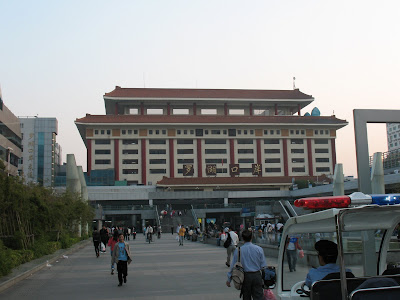update on little things that happened
There was a little forest fire yesterday near our campus. We're tucked right up against the Pat Sin range, which were lush and vibrantly green in august and now, despite the humidity, have browned quite a bit, and even blurred by the haze, no longer look nearly so pleasant. I was outside, handing out flyers to passing students/staff/random visitors about activities we're putting on this week, when all of a sudden, I saw a very low-flying helicopter swoop in over campus, a large red bucket slung beneath it. My friend pointed out the thin smudge of smoke rising against the mountains nearby, and told me that the helicopter had been flying back and forth, hauling water over to dump (from low altitude, and so out of our line of vision) on the nascent fire. We watched it fly back and forth from the fire just north of us to what was almost certainly the reservoir to our southeast. Each load of water required more than one pass, since presumably the pilot wanted to dump most of it on a relatively small area, so we got to watch him take his craft through sharp turns in the valley below us, the bucket describing wide arcs to his nearly-in-place pivots. Unfortunately, I didn't have my camera. But it was pretty cool, seeing a helicopter doing something important up-close like that.
And then parts of yesterday evening and today, when the wind died down, the air smelled burned and gross and I was less happy about the whole situation.
I mailed a letter today. Our "post office" is a truck that comes to campus from 10:30-11:30, mondaywednesdayfriday, so I'd been meaning to send this one for a while but kept either working or sleeping through the critical hour. First of all, I was surprised to find that an airmail stamp to the US for a letter (no postcard, this) was comparable to, maybe even cheaper than, a first-class stamp in the US. Secondly, I don't have envelopes here, so instead of trying to find, you know, an envelope store or something, I found instructions on the internet and folded my own. I was in a bit of a hurry, so it's not perfect, but I think it looks pretty nice, and it seemed to seal ok. Which is important, because neither I nor the postal truck had tape, so it's just folded shut, not really sealed. Chris, if you get an empty envelope, I apologize and I'll send something for serious (taped shut) soon.






